- Home
- Will Hobbs
Kokopelli's Flute Page 3
Kokopelli's Flute Read online
Page 3
For years now our Mister K. has been collecting rare seeds from the few dryland farmers who are still raising the old food crops, and he’s been sending the seeds to us. We’ve gotten seeds from him mailed from as far away as Guatemala and as close as the Indian pueblos near Santa Fe. But we’ve never met him and don’t have any idea how he ever heard of the Seed Farm. All we ever get is the seeds with something scribbled down about where they came from. We don’t even know for sure if Mister K.’s ever seen our catalog, though we guess he has. We wonder if he’s heard how his seeds are starting to get around now, even to foreign countries where they’re desperate for crops that don’t need a lot of water.
Mr. K. isn’t our only source for seeds, but he goes back the farthest—six years, all the way back to our second summer. And his seeds have always been the most interesting to my father.
As my father was talking, he was letting some of the new seeds—golden tepary beans—run through his fingers and into a teacup. He loves to handle seeds, and so do I. There’s something about the feel of them, especially beans. They’re so smooth and shiny. “Mr. K sent three new kinds of teparies,” my father was saying, “plus a cushaw squash I don’t think we’ve seen before, some kind of gourd seeds, and a sixty-day corn—all late-season varieties to plant before the rains.”
It was my father who named me Tepary, after the beans. They aren’t as big as a lot of beans, either as seeds or as plants, but they’re the hardiest in the world. Teparies can sprout, grow, and bear on a couple of rains. In fact, we got a letter from one of our subscribers in Arizona who said one rain was all they’d had the summer before, but that’s all our teparies had needed. Teparies have roots twice as long as any other bean and small leaves that turn all day to track the sun. I guess when I was born, my father thought I’d have to be awfully hardy to survive, like a tepary. Barely over two pounds, that was all I weighed.
My father poured the golden teparies back into a small paper bag, which he returned to a basket with other bags full of seeds. “I’m going to start planting some of the seed that Mr. K. just sent, along with the others that need to go in before the rains come, if and when they come.”
“They’ll come,” my mother assured him.
“For a scientist,” my dad said to me, “your mother’s got an awfully long optimistic streak. This is dry country. One of these summers the rain could skip us.”
“Keep the faith,” my mother replied.
My father reached out and hugged her close. “Faith is the Seed Farm’s currency,” he proclaimed. “It’s certainly not cash!”
Absentmindedly, I was looking over the new seeds in the paper bags. Tepary beans, squash, corn … I could see from the shapes, sizes, colors, and markings that they were all slightly different from the varieties we already had. “Where’s the gourds you mentioned?” I asked. “Didn’t you say Mr. K. sent gourds?”
“It’s too late to plant gourds.”
I knew my dad was right. We’d planted gourds back in the first week of May. We raise them for people to make rattles and dippers from, and just for decoration.
“So why’d Mr. K. send them in June?” my mother wondered. “Isn’t that when he sends seeds that can be planted late?”
“He always has before….” my father agreed. He stroked his smooth chin and said, “I wonder if you’re on to something.” He went over to the clutter on the big table to retrieve the gourd seeds. “Maybe there’s a message?”
Sure enough, he pulled a slip of paper out of the bag and held it up dramatically, “IT’S LATE, BUT PLANT THESE ANYWAY,” he read, and then he declared, “Of course I’ll do it. If Mr. K. said to plant them in concrete, I’d do it. I wonder … I wonder what they’ll do.”
My mother smiled to see him so intrigued. There were many sorts of things that made my father happy, and very high on the list was discovering a new variety of a plant that was somehow different from all its relatives. The length of its growing season was an important difference, like resistance to disease or how little water it could get by on.
“What a team we are,” my father marveled as he caught my eye. “Without you and me putting in our two cents’ worth, and your mother contributing a dime, we wouldn’t have got these gourds in the ground today.” With that he headed out the door.
My dad’s first job would be to get the college students lined out for the morning. He always met them at Big Pink, the old adobe-mud house where they lived down at the far end of our fields. They were getting up early these days. When they first got here they’d slept in, but as June started warming up they caught on to how it wasn’t so much fun to work in the heat of the day. They were all wild about working on the Seed Farm, for love and for college credit, but they weren’t stupid. Now they even beat my father out to the fields sometimes.
I spent the day working on my raven defenses out in the corn patches, erecting poles all over and connecting them with a network of parachute cord to hang things from, whatever I could think of that might slow the ravens down this year.
No matter how hard I tried to keep my mind on what I was doing, I couldn’t push my nightmare away. I kept wondering if there really was a corpse of an ancient albino medicine man lying in a heap of rubble up in that room at Picture House.
I had a pile of bones I’d been collecting behind the house; they rattle in the wind nicely and sometimes spook ravens. Late in the afternoon I was collecting a bunch to hang up on my lines when I discovered the eagle-bone flute in the pile. I stood there struck dumb to have it in my hands again. Obviously it was the same one. Ringo must have taken it from my room and left it here, I concluded. All of a sudden I was shaking. What if none of it was a dream?
I tucked the flute away in my pocket. I had a lot to think about. At supper I kept glancing at the note my father had stuck on the refrigerator just a few days before. It said, EAT THE BIG FROG FIRST.
I’m not sure what it meant to him, but the big frog at the top of my agenda was a return visit to Picture House.
Rodney, that was the other guy’s name.
5
Dusty and I approached the big cave cautiously, listening for voices. Then, from three different places, I watched. Picture House, with its forty-three rooms and its two towers, looked the same as ever. I began to breathe a whole lot easier.
But as I approached the red cliff with all the picture writings, boot tracks on the chalky ground brought my breath up short. There were tracks all over the place, and a lot of them weren’t mine.
I listened, and Dusty did too. All I heard was the profound silence of Picture House.
Looking around, I wondered if I was being watched. I didn’t think so.
I was stalling. Finally, I approached the keyhole doorway into the room nearest the petroglyphs. The edge of a mound of rubble was showing. I dreaded what I had to do, but if I was going to report a crime I had to know what I was talking about.
I paused outside the doorway, and tried to slow my heart down. If anything it beat faster. I bent and ducked inside.
What caught my eye first was the smashed lantern next to the mound of rubble. But in the next instant I saw the empty eye sockets of the medicine man, his long teeth in the gleaming jawbones, his blotchy pink skin drawn tight like rawhide across his forehead, his white-blond hair. He’d been buried with his knees drawn up against his chest, and so he remained, with shreds of a rabbit-fur blanket remaining here and there. His head was now separated from his body.
I held my hand to my nose and mouth, though the scent of decay was so slight I may have imagined it. At least the packrat midden jammed in the space behind the wall hadn’t fallen out on him. It was still glued to the cliff.
The smashed pot that had housed the basket had fallen next to the medicine man. Its lid remained unbroken. Bits of the upside-down mountains that had been painted on the plastered surface of the wall lay here and there amidst the destruction. I stooped to pick up a piece of what had been the full moon, and then put it back where I had fo
und it.
I had no business being here, looking on him, violating his secrecy. I should never have touched his flute. Last night I’d been a grave robber too.
I took the bone flute from my back pocket and placed it in the grip of his skeletal fingers. “I didn’t mean any harm,” I whispered. “Please let me be.”
Dusty had remained in the doorway. I turned from the ancient corpse and we both went outside. The sun was setting and a dagger of light on the cliff wall caught my eye. It was cast by the fracture in a tall piece of rockfall out in front of the ruin. The dagger was moving down among the petroglyphs, and I watched its passage. I’d never noticed it before. The dagger of light passed halfway between the Kokopellis, exactly between the spirals, each a foot across. The spirals brought to mind the enormous eyes of an owl. I’d never noticed that before either.
The sun was squeezing down below the horizon. I had the dreadful premonition that what had happened the night before when I’d put that flute to my mouth might happen again. I tried to slow my heart. I’d returned the flute and everything was going to be okay.
I dashed around the ruin, trying to find if the pothunters had done any other damage. None of the other rooms had been dug, but at the upper end of the ruin, close to the cliff at the back of the cave, I found a pit that had obviously been dug recently. I realized that this was where the seed jar had come from, the one I’d seen them with.
Close to the pit lay a knee-high rock slab where the women of Picture House had ground their corn. Over the centuries they had worn five parallel grooves into the slab with the strokes of their manos, the smooth grinding stones held in the palms of their hands.
Behind the slab I noticed a small pile of golden corn kernels on the ground. The pothunters had dumped them out of the seed jar they’d dug up. I picked them up and examined them—I’d never found corn at Picture House before. The kernels looked just about the same as the ones we dry every fall and sort into seed packets for selling. But these were ancient.
Ever since I can remember, I’ve been trying to sprout seeds I’ve found around ruins. I’ve tried corn, I’ve tried squash, I’ve tried beans. Not a single seed has ever sprouted, but I keep trying. It’s not supposed to be possible, because those kinds of seeds don’t stay good for very many years. Their coats aren’t thick enough or their insides tough enough.
The only way they can survive, as my father always likes to point out, is if people keep raising them.
But still, I’ve always had this dream that if I keep trying, if I just keep believing, one day I’d get some ancient corn or squash or beans to sprout and grow.
The sun was down now, and the eastern horizon was glowing where the moon was about to appear. I’d just said to Dusty, “Let’s pick up this corn before the mice discover it,” and stuffed a handful into my pocket. That’s when it happened. Whatever magic I’d gotten mixed up in with that medicine man and his flute, it had a hold on me now whether I’d given the flute back or not. I could feel those whiskers twitching. I was shaking all over, terrified to have it happening again, and there was nothing I could do to stop it.
Dusty cocked her head one way, then another, watching all this happen. “It’s me!” I was telling her, as I’d told Ringo, but all that came out were squeaks.
Dusty put her nose right next to my face and whiskers, and sniffed me carefully. I froze. Her face loomed gigantic in front of me. I was overwhelmed by her scent, the scent of an enemy.
I panicked, and dove into a cluster of sharp rocks.
I could hear her coming and going, looking for me. I thought my heart would explode, it was beating so fast. After a while I made my way into a niche in the cliffs, where I began to squeeze through a narrow passage. It led through a maze of sticks bristling with cactus spines into an opening lined with soft grasses. What was I going to do now?
A moment later all I could think of was food. I could detect the smell of it nearby, and the pangs in my stomach were unbearable. I crept forward in the darkness through another passage, feeling my way with the whiskers as my eyes adjusted to the murky light. The passage led to an enormous mound of pinyon nuts. I picked one up in my hands and began to chew as fast as I could. I’d eaten only half of the nut when I heard, close and loud, a terrible drumming. I looked up to see a packrat beating out a warlike message with its hind foot. The rat bared its teeth, sharp as swords.
The next thing I knew there were three of them after me, maybe more. Squeaking and biting at my backside, they chased me out of there. I ran for my life.
Once in the open I ducked inside the closest room in the ruin, and then I fled from one to the next looking for shelter. Everywhere I went I ran into packrats carrying things around, dropping this and picking up that. As soon as they’d see me, they’d run me off. At last I found a dark corner to hide in, but as soon as I felt safe, all I could think about was my stomach, which was cramping. I had to find something to eat.
Then I remembered. Out by the pits the pothunters had dug, there was corn.
I came out into the silver moonlight, and I soon found the corn. I never stopped to think why none of the rats had discovered it yet; I was only grateful they hadn’t.
The corn was good. I was intent on eating every bit of it. I never paused to figure out why none of the packrats were showing themselves in the moonlight.
Suddenly I saw Dusty, from nowhere, leaping toward me. I recoiled, certain I was going to die.
But it wasn’t me she was after—she was leaping into the air above me. Then I saw the reaching talons below wings wide as the sky. Dusty knocked that owl from the air a moment before it would have snatched me, pierced me through, and flown me to its young. I hadn’t heard that bird coming, not one hint. Silent death, that’s what that great horned owl would have been.
With a mighty rush of wings, it flew away.
Dusty put her great face next to mine. This time I wasn’t afraid. She knew me. How else could I explain it? Dusty knew it was me. I stuck close to her the rest of the night. We curled up together, and I slept.
As the sun was rising, the magic broke loose and gave me back myself in an exploding moment of transformation, just as it had the day before. Dusty watched it happen again. She wagged her tail, and I patted her on the head. I thanked her for saving my life.
Was this going to happen all over again with the setting and rising of the sun? I dreaded that it would.
This is your own fault, I told myself. You wanted to find ancient secrets, now you’ve got one.
I had to get myself free of the magic. That flute, I thought, that medicine man’s flute is the key. The flute had turned me into the nearest living creature—the packrat who’d come close to hear those first notes I’d made. I wasn’t sure about anything really, but I had a feeling I’d better go back to the corpse and get that flute. If the flute could do this, I had to hope it could undo it as well.
I ducked back through the low doorway of the pillaged room. The medicine man was still there, but the flute was gone from the bones of his fingers.
My first thought was that the pothunters had returned during the night. But I saw no new footprints. Then I realized that the packrats must have taken it. Trader rats, that’s another of their names, because of the way they’ll drop one object for another, seeming to make a trade. And here, by the albino’s hand, was a matchbook a rat might have dropped when it picked up the flute. The matchbook was from the Hacienda Motel in Encantado. Had the pothunters dropped it nearby the other night? Were they staying right in Encantado, only seventeen miles from the Seed Farm?
I pocketed the matchbook. Maybe I could find the flute later. For now all I wanted was to head home. I’d show the matchbook to my parents and tell them about the pothunters, the sooner the better. Then I’d have to tell my story to the sheriff and the Bureau of Land Management ranger too. How was I going to explain waiting a day to report the crime?
What a mess I was in.
How was I going to explain to my parents why I
had just stayed out all night?
I could say I’d found the matchbook the night before, when I was up at Picture House for the eclipse, and that I went back because I got to worrying that someone might be hanging around up there, up to no good. Then, when I returned, I saw everything that really I’d seen the night before. Only the pothunters would know they had committed their crime the night of the eclipse. It was going to be the best I could do. I’d never had much practice lying.
I could have dropped in my tracks, I was so tired. At last Dusty and I reached the rimrock above the Seed Farm. The sun had already sailed pretty well up in the sky. We could see my father and the college students planting down below.
What a mess.
6
Picture House has been bombed!” I told my mother, and she had me run for my dad. I told them everything I thought I could tell them, and it made them sick. They worried that the pothunters would return again and soon. My dad called the Bureau of Land Management ranger in Encantado, and tried to put me on the phone, but I guess the ranger didn’t want to talk to a kid unless he had to. I was relieved. My dad told him everything just the way I had said it; he even remembered to mention the matchbook. After all of that my father asked what was going to happen with the corpse of the medicine man.
My dad was slow to speak after he placed the phone back on the hook. “Well, what did the ranger say?” I asked.
My dad glanced from me to my mother, who was just as anxious. “He’s trying to get ahold of the sheriff right away. He didn’t sound hopeful. They never have much luck catching pothunters, much less convicting them. But he’s going to send someone from the BLM office to watch Picture House, in case they come back.”
“What about the medicine man?”
“He said he’d call one or more of the pueblos near Santa Fe. The elders will come and rebury the medicine man in some secret place—the ranger thought they’d try to get it done right away.”

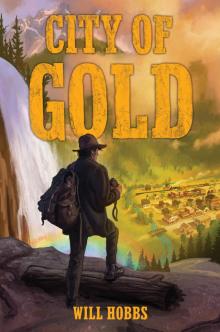 City of Gold
City of Gold Kokopelli's Flute
Kokopelli's Flute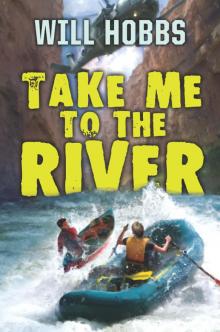 Take Me to the River
Take Me to the River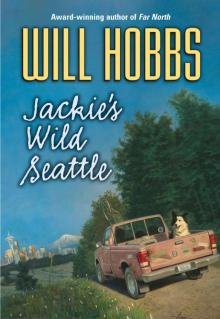 Jackie's Wild Seattle
Jackie's Wild Seattle The Maze
The Maze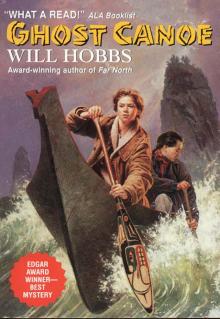 Ghost Canoe
Ghost Canoe Never Say Die
Never Say Die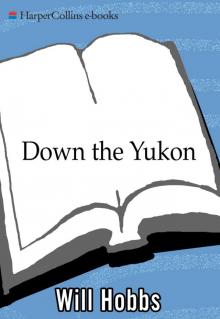 Down the Yukon
Down the Yukon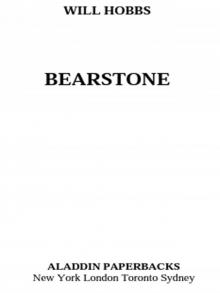 Bearstone
Bearstone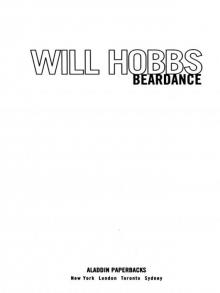 Beardance
Beardance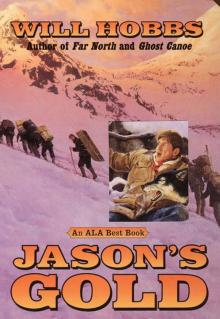 Jason's Gold
Jason's Gold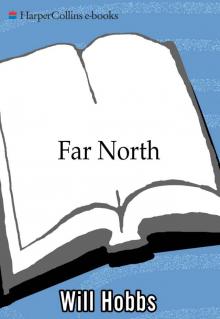 Far North
Far North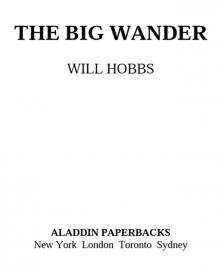 The Big Wander
The Big Wander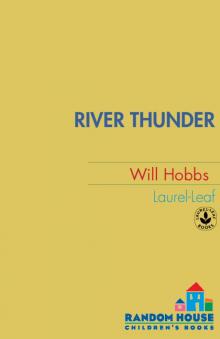 River Thunder
River Thunder Downriver
Downriver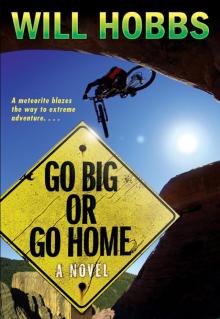 Go Big or Go Home
Go Big or Go Home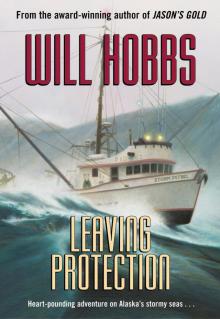 Leaving Protection
Leaving Protection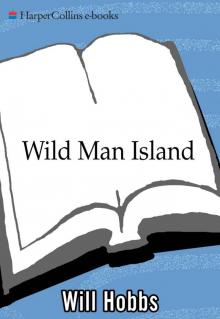 Wild Man Island
Wild Man Island